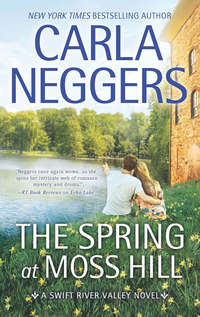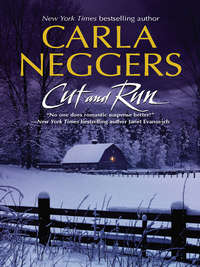
Полная версия
Abandon
His wife, a native Tennessean, was famous for her southern casseroles. Mackenzie smiled in turn. “So long as she makes fried apricot pies for dessert, I’m game.”
Nate started to say something else, but broke off. “All right. I’ll keep my powder dry for now and see you back here next week.”
Mackenzie took a breath, debating whether to press him on what he wasn’t saying. Did he know about her involvement with Rook? Possible, but unlikely. She hadn’t told Nate she was seeing someone. Not that she was hiding it—the subject just hadn’t come up.
Still, Rook was a hotshot FBI agent, and Nate had been around a long time and knew everyone.
“Nate—” She stopped herself, deciding there was no point in dredging up a few dates with a guy who’d just dumped her. “Thanks for stopping by.”
“Anytime, Deputy.”
After he’d left, Mackenzie checked the air-conditioning. It was cool in the house. She turned the temperature up slightly, then listened for ghosts. “Abe? Bobby E.?” She whistled as if calling them. “I sure could use your advice right now.”
Yeah, she thought. About why I’m talking to ghosts.
Because it kept her from thinking about Rook.
At least she didn’t have to worry about him blabbing to a senior federal agent who treated her like a third sister. Rook was ambitious, as well as humorless, and a snake, and he’d keep mum about having given her the boot.
She’d be more careful next time some good-looking man got out of the rain with her, but she couldn’t bring herself to regret the movies and dinners with him—and the kisses, she thought. The brush of his fingertips on her breasts, her back…
What had prompted him to cancel—correction—to dump her altogether? Had he learned something about her that he thought would hurt his career? She hadn’t been on the job that long. She was closely supervised. She hadn’t had a chance to screw up or develop a bad reputation.
Bernadette? Did Rook not approve of her friendship with a federal judge? But that made no sense. Bernadette was a solid, fair judge with an excellent reputation.
A knock on the back porch door startled Mackenzie out of her obsessing.
Cal Benton, looking awkward, gave a curt wave through the glass panel.
She opened the door. “Hey, Cal. I’m glad you’re not a ghost. You had me worried there for a second.”
“A ghost?” He seemed to have no idea what she was talking about. “Mackenzie, are you all right?”
“Never mind. Please, come in.”
She stepped aside, and he strode past her into the small kitchen. He was in his late fifties, tanned, healthy, aging well—and not a man anyone who knew Bernadette would ever have expected her to marry. Before their relationship had soured, they’d said they admired each other’s intellect and experience. They could laugh together, and they enjoyed each other’s company. Apparently, something was missing, or something had gone wrong.
“I won’t keep you.” Cal was dressed in a pale gray suit, crisp-looking in spite of the heat. “Bernadette said you were going home for the weekend.”
“I’m flying into Manchester at the crack of dawn.”
“She said—” His cheeks reddened, and he sniffed awkwardly, then continued, “I understand you’re staying at her house on the lake.”
Mackenzie yanked a chair from the table and sat down, stretching out her legs and suddenly feeling tired, even more out of sorts. “I haven’t told her, if that’s what you’re wondering.”
He glared at her as if she hadn’t done him any favors. “Bernadette and I are divorced. Who I see is no longer any concern of hers.” He paused, obviously for effect. “Or yours.”
In the three years since Bernadette had met and married Calvin Benton, Mackenzie had tried to like him. Now, she didn’t bother. “Unless you and one of your ladies of the hour sneak onto Beanie’s property for a little skinny-dipping on the sly—”
“We didn’t skinny-dip.”
“Close enough.”
Earlier in the summer, before she’d left for Washington, she’d accidentally caught Cal and a woman at least thirty years his junior at Bernadette’s lake house. They weren’t officially divorced at the time, but it didn’t matter. Divorced or almost divorced, he still had betrayed Bernadette by using her home for an illicit romantic weekend.
“I’ve never liked the lake.” He spoke through half-clenched teeth, his tone acidic. “The water’s always cold. The house is run-down. Bernadette would never listen to me about improvements. It was a bad idea to take a friend there.”
“You don’t want her to find out, but you like knowing how hurt and angry she’d be if she did.”
“Maybe so, but don’t be too quick to judge me. You don’t have a clue what it’s like to be her husband. The sainted, brilliant Judge Peacham.”
“If you’re here to convince me to continue to keep my mouth shut, you don’t have to worry. I have no intention of telling her about your little liaisons at the lake. But they have to stop, Cal. No more.”
“They’ve stopped.” He inhaled through his nose, and for the first time, Mackenzie sensed he was embarrassed. “And that’s not why I’m here.” He seemed suddenly to notice the heat, still oppressive despite nightfall, and rubbed the back of his neck. “Have you seen Harris Mayer?”
Mackenzie tried to conceal her surprise. J. Harris Mayer was one of Bernadette’s longtime friends, but not someone Mackenzie knew well. “Recently?”
“Since last night.”
“I didn’t see him last night. Was he at the party?”
“No, but he was—” Cal stopped himself, straightening his spine, showing no hint now of his earlier discomfort. “Never mind. My mistake.”
“It’s okay, but what do you want with Harris?”
“We were supposed to get together tonight for dinner. I’m sure he just forgot. It’s not like I’ve never been stood up before.”
But he’d never knocked on Mackenzie’s door looking for his missing dinner mate. She’d met Harris Mayer when he and his wife would visit Bernadette at the lake, long before the gambling scandal that had forced him into early retirement and disgrace. He’d lost money he couldn’t afford to lose, he’d lied to his family and friends, he’d used everyone he could think of to get any kind of advantage—and while he hadn’t gone to jail, he’d paid for his compulsions. His wife had left him. Their two grown children had little to do with him. His friends had deserted him.
Except, of course, for Bernadette, who was loyal and forgiving to a fault.
“Why would you get together with Harris Mayer?” Mackenzie asked.
Cal looked uncomfortable. “Because he asked. I’m sure he just decided to get out of this heat for a few days and forgot about our dinner. The years haven’t been kind to him. Sorry to disturb you.”
“Did you try to call him?”
“Of course—and I stopped by his house. It was just a stab in the dark to stop by here and check if he’d said anything to you last night. But I gather I was mistaken, and you didn’t see him.”
Mackenzie frowned. “Cal, what’s wrong?”
“Nothing.”
“If you’re worried about Harris, you should talk to the police—”
“I’m not worried. I also wanted to talk with you about the other matter. What you saw at the lake. I’m sorry, Mackenzie. I shouldn’t have put you in the position of keeping a secret from Bernadette.” He seemed surprised by his own words, but added quietly, “You’ve been a good friend to her.”
“And she to me. But, Cal—”
He glanced at his watch. “I have to go.”
Short of siccing her ghosts on him or finding a reason to arrest him, Mackenzie had no way to make him stay and tell her what was on his mind. But his car wasn’t out of her driveway before she dialed Nate Winter’s cell phone. “J. Harris Mayer?” she asked after he clicked on.
She was met by silence.
“Nate?”
“What about Mayer?”
Mackenzie related her encounter with Cal Benton, leaving out, as she’d promised, any mention of his liaisons at the lake.
When she finished, Nate said, “Strange that those two have hooked up at all. Mayer could want to retain Benton as his lawyer for some reason. It doesn’t matter. If I were you, I’d just forget about it.”
“If you heard I was at the literacy fund-raiser last night, did you hear Harris Mayer was?”
Nate was done with the conversation. “Have a good weekend,” he said, and hung up.
Mackenzie didn’t throw her phone at the wall, but was tempted. She debated calling Bernadette. If she did, Bernadette would ask questions, and Mackenzie knew she was too agitated, too irritated, to answer them without giving herself away. Then there’d be more questions, and just to keep from telling Bernadette about Cal and his cute brunette, she’d no doubt mention Rook, their three weeks together, how he’d dumped her.
It’d be a mess. Bernadette could always see through her. She would be able to tell—no matter how Mackenzie tried to hide it—that the one-time-hellion kid she’d saved had fallen fast and hard for an FBI agent.
Mackenzie locked the porch door and turned up the air-conditioning another notch. She hadn’t let firearms training and defense tactics and learning to drive a car like a bat out of hell derail her. She wouldn’t let Andrew Rook. She would get control of her emotions, just as she had during training when she’d faced fresh challenges, new fears.
She went into her little sitting room with its worn wood floors and simple, tasteful furnishings. Sarah Dunnemore Winter’s touch.
Aware of the silence of the historic house, Mackenzie sat on a cozy love seat and studied a pair of old prints hung side by side on the wall opposite her. One depicted Abraham Lincoln giving the Gettysburg Address months after that bloody battle. The other was of Robert E. Lee on his horse—she didn’t recognize when or where. She didn’t know the story of how the two well-known nineteenth-century Americans supposedly had ended up haunting the house. It was in the brochures Sarah had so meticulously researched and written for prospective tourists.
Mackenzie promised herself she’d read one.
“In the meantime,” she said aloud, sighing at the two adversaries, “if you boys are around, now would be the time to show yourselves.”
But there was no answer, only the creak of old floorboards, and she gave a mock shudder of relief at the silence. Thank heaven, she thought, jumping to her feet. Bad enough if she ever had to explain Rook to her marshal colleagues. If ghosts started talking to her, she’d be kicked back to her campus ivory tower in New Hampshire, and be writing her dissertation in no time flat.
Three
Harris staggered out of the hole-in-the-wall Georgetown bar, an old favorite where he could place a gentleman’s bet and not have to worry about anyone sniffing in disapproval. He was tired and he’d had too much to drink. After twenty-four hours, he could no longer drum up any energy for steering clear of friends or enemies. He had no attention span for going into hiding.
It was late on a dark, hot summer night. Who the hell would bother hunting him down now?
When he reached M Street, he recognized a Washington Post columnist and a prominent U.S. senator getting into a private car, and gave them a surreptitious middle finger, hating them for the life he’d squandered. Once, he’d had his own driver. Now he was reduced to cabs, buses and an ancient Honda that was a bother to keep on the road. It wasn’t a question of finance as much as of prestige.
People who had nowhere to go didn’t need drivers or fancy cars.
He smelled of stale cigarette smoke, sweat and alcohol. He walked past nice bars, nice restaurants, heard music and laughter and saw people who looked good, were good. He’d been like them once, filled with hope, ambition—and hubris. He’d known he was smarter than most people. He could not fail.
Now he had the FBI hunting him.
And worse.
The heat and stifling humidity started him sweating again. His shirt stuck to his back. His eyes stung. He wanted to vomit, but not on M Street. Not in front of people who used to respect him.
Then again, why the hell not? Who did they think they were? They had their own secrets and compulsions. Everyone did.
“Harris, for God’s sake.”
For a moment, Harris didn’t realize who was speaking to him, but he looked up and saw Cal Benton, as if he’d materialized out of nowhere. “Cal?”
Cal hooked a hand around Harris’s forearm just beneath the elbow. “You’re drunk.”
“Tipsy. I have higher standards for drunk.”
Cal smelled of antiperspirant, as if he’d given himself a fresh swipe before getting out of his car. He was sweating, too, but he’d have to be inhuman not to sweat on such a night. “In here,” he said, tugging Harris toward a nearly empty coffee shop.
“If we’re seen—”
“We won’t be.” Cal opened the glass door, pausing to glare at Harris. “Unless your new friend Special Agent Rook is on his way.”
Harris licked his lips. Even after three beers, he felt dehydrated, parched. “Who?”
“You slimy, corrupt son of a bitch, Harris.”
Cal’s reaction was a sign of panic. Incipient fear. “Here’s the pot calling the kettle black, isn’t it?”
“Damn you to hell.”
Harris didn’t respond. What was the point? Over the past five years, he’d grown accustomed to people damning him to hell. Cal shoved him onto a rickety chair and briskly went to the counter, soon returning with two coffees.
“Those paper cups burn my fingers,” Harris said, hearing the whininess in his own voice. He’d always hated whiners. “Don’t they have any of those little cardboard holders?”
“No. Start drinking. You need to sober up.”
“I am sober.” Harris leaned over slightly, so that he could inhale the steam from his coffee. “Too sober.”
“Damn it, Harris,” Cal said with a hiss. “I’ve been looking for you since last night. I saw you at the hotel with your FBI agent. What the hell were you doing? Anyone could have seen you.”
“Special Agent Rook and I were just having a quiet drink. I know a lot of FBI agents.”
“I checked him out. Rook’s a tough customer. He’s not talking to you out of the goodness of his heart.” Cal placed his elbows on the small table and clenched and unclenched his fists, staring at them. Finally, he regarded Harris not so much with hostility as disdain. “He’ll throw you under the bus, you stupid bastard.”
“I haven’t told him anything about you, Cal. I wouldn’t. You’re not the one—”
“Rook doesn’t care about you.” Cal didn’t raise his voice. “He cares about what information you can give him to help him advance his career. That’s it.”
“He’s ambitious, but he’s not dishonorable.”
“Dishonorable?” Cal snorted in disbelief. “Only you, Harris. People don’t care about honor anymore. They care about results.”
Harris wished he could think clearly, but thoughts floated by him, just out of his grasp. Nothing felt nailed down. It was as if he was on a current of air that was taking him wherever it wanted, and he had no control.
He leaned over his coffee, the steam rising into his eyes. “Rook can save Bernadette.”
“From what?”
“From you, Cal.” Harris raised his gaze to the man across from him. “And from Jesse.”
There. He’d said the name. Jesse Lambert. The devil.
Harris had known Cal even before he’d started seeing Bernadette, but only in the past three months had their fates become intertwined. Cal was hard-driving and ambitious, a womanizer who had seemed, at least in the early days of his marriage to Bernadette, ready to settle down.
Bottom-feeder that he was, Jesse Lambert had sensed Cal was ripe for the picking. With impeccable timing, he’d pounced at Cal’s weakest moment.
And Harris had helped.
“You should give him the money,” he said. “Trust me, Cal. I know of what I speak. Give him the damn money now. Then get out.”
Cal averted his eyes. “If I give Jesse the money, there’ll be no getting out. Ever.” He returned his gaze to Harris. “I’ll turn into you.”
“If you don’t pay him, he’ll kill us both.”
“He’s a dealmaker, Harris, not a killer. We’re offering him a deal. Don’t weaken now.”
Harris could hear the disdain for him in Cal’s voice. After all, Harris was the one who’d brought Jesse Lambert into Cal’s life.
Into Bernadette’s life.
That was what ate at his soul. In using Cal, Harris knew he was also using the one friend he had left in the world.
“Jesse is the devil, Cal,” Harris said quietly. “And we made a deal with him.”
Cal didn’t respond right away. He drank his coffee, eyeing Harris, his expression unreadable. Jesse Lambert had walked into Harris’s life five years ago, preying on his insecurities and compulsions—and Harris had let himself be victimized. The gambling scandal that had ended his career was the least of his transgressions. Because of Jesse, he had betrayed his friends and the public’s trust for financial gain.
You let the devil have his way with you.
Three months ago, Jesse had returned to Washington, wanting fresh meat in return for his silence about Harris’s wrongs.
Harris had thrown him Cal Benton.
Cal’s work and his marriage to Bernadette Peacham provided him with the kind of access and information that Jesse could use. He stayed in the background, maneuvering, manipulating. But when Jesse came to collect, Cal had refused to pay up.
“It’s time to give the devil his due, Cal.”
“We will, but on our terms. We’re not stealing his money. We’re delaying payment in return for Jesse getting out of our lives.”
“We?”
Cal leaned forward. “Don’t think Jesse doesn’t know you helped me.”
Harris could feel the blood drain from his face. A few weeks ago, he’d dropped one tidbit about Jesse Lambert to Cal, and Cal had run with it, uncovering Jesse’s true identity. Cal had a complete dossier on their devil. Names, addresses, bank accounts. His insurance policy, he called it. His game was straightforward but dangerous. Using information Cal provided, Jesse blackmailed people—among them a popular U.S. Congressman, a powerful Senate aide and a well-to-do, well-connected Washington widow. Jesse remained in the background, anonymous. Cal and Harris were the ones who arranged payments. In three months, they’d amassed $1.5 million. In cash. They were to split five hundred thousand, and Jesse was to get a million.
Only Cal was withholding the million until Jesse exited from their lives.
He’d keep the dossier. If Jesse ever breathed Washington air again, it would end up in the hands of federal investigators. They wouldn’t need to know a thing about Cal or Harris’s involvement with Jesse to nail him.
“Going to the FBI won’t save you,” Cal said.
“I haven’t given them anything. I just thought if they were looking…” Harris trailed off and blew on his coffee, wishing he could understand his own motives, his own thinking. When he’d first gotten in touch with Andrew Rook three weeks ago, his plan had seemed so logical and sensible. Now, he didn’t know. Finally, he shrugged at Cal. “I guess I hoped Jesse would think twice about killing us if I’d talked to the FBI.”
“Does he know?”
Harris shook his head. “I don’t think so.”
“You’re a sniveling weakling, Harris. You’re trying to save your own skin. That’s all.”
“If only you’d been faithful to Bernadette…” Harris pushed aside his coffee and sank into the cheap wooden chair. He felt crumpled, saggy and old. He’d broken so many promises over the years—to his ex-wife, his children, his friends. To himself. “I don’t want her to get caught in the cross fire.”
Cal’s jaw tightened visibly, and he spoke through half-clenched teeth. “She won’t.” There was no hesitation in his tone, no regret, no guilt.
Harris stared at his coffee, a film forming on it as he tried to get his head around his thought. “But it’s not fear of humiliation that sucked you into Jesse’s orbit, is it, Cal?” He looked up, giving Cal a knowing, bitter smile. “You wanted the action. The risk. The same impulses that prompted you to take your little tootsie to Bernadette’s house for the weekend got you into the pickle you’re in now.”
“Would you have preferred I’d capitulated and let Jesse put out the pictures for the world to see? How would that have helped your good friend Bernadette?”
They were graphic pictures. Harris had seen them. Cal Benton copulating with a very young, inexperienced, beautiful Congressional aide in the bedroom he and his wife had once shared. They were the kind of scenes that would not only ruin him, but the aide and Bernadette. Her authority in the courtroom would be diminished with those images in people’s heads.
But Cal hadn’t cooperated with Jesse Lambert for noble reasons—or even just to protect himself. He liked living on the edge. Jesse had seen that quality in him and used it to his advantage, luring Cal into his world of blackmail, extortion and fraud.
“I played Jesse’s game,” Cal said. “Now I’m pushing back, hard, because that’s all he’ll understand. You don’t fool me, Harris. You don’t give a damn about my sainted ex-wife.”
“What do you want from me?”
“I want you to stop talking to the FBI.”
“I haven’t told them anything of substance—”
“Good. Don’t.” Cal gave him a long look. “You can’t weaken. You can’t waver. Stick with me, Harris. I know what I’m doing.”
“No, you don’t.” Harris couldn’t remember when he’d felt so tired. “You don’t have a clue.”
Cal sniffed with impatience. “Go into hiding, then. Leave Jesse to me.”
“I already have gone into hiding. I just—tonight…” He broke off, not knowing how to explain his actions. “No one knows where I’m staying.”
“Rook?”
Harris shook his head. “No one.”
Cal slumped in his chair in relief. “That’s good, Harris. Excellent.”
“My advice, still, is to give Jesse his money and the dossier you have on him.”
“He won’t know if I’ve made copies of the information—if I have it all stored in my head. No, we’ve done what we’ve done, Harris. I have his money, and I have enough to put him away for decades. He’ll cooperate.”
Harris didn’t think so.
But Cal was on his feet. “Go, Harris. Leave Jesse to me.” He smiled, his arrogance and confidence back. “Hide.”
Harris didn’t respond, and Cal left, not so much as glancing into the coffee shop as he passed by the window on the street outside. Harris remembered himself in court, holding the attention and respect of everyone present. He’d squandered his reputation—that life—because of weakness, greed and the constant search for excitement. But he’d learned a few things during those years. He could recognize a violent man when he saw one.
And Jesse Lambert, he thought, was a violent man.
Twenty minutes later, Harris stepped out of a cab in front of the shabby rooming house on a bad street in southeast Washington. He’d fled here last night after his meeting with Andrew Rook, terrified of the consequences of his own actions. Harris had fought a sense of impending doom all day. It was what had driven him to the Georgetown bar. His fear had made him careless.
The odor of fresh dog excrement permeated the hot, humid night air. What the hell was wrong with people, not cleaning up after their pets? With a hiss of disapproval, Harris unlocked the separate entrance to his small studio apartment, in an ell off the run-down main building. He could hear someone vomiting down the street. Thanks to the smart management of a family trust by a financial advisor who loathed him, Harris remained in possession of a beautiful home on a prestigious street in Georgetown. But he couldn’t go back there, at least not for now.
He pushed open the door, then shut it tight behind him, blocking out the vomiting, the cars, the heat, the smell. He caught his breath, letting the cool air and his isolation soothe his taut nerves. He could ignore the seedy furnishings.
“Feeling sorry for yourself, Harris?”
Harris swung around as if he had heard a ghost. Or had he imagined the voice?









